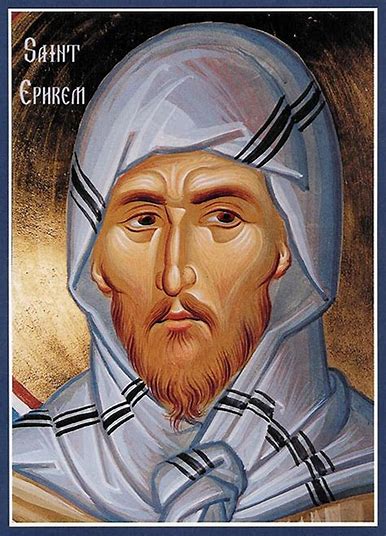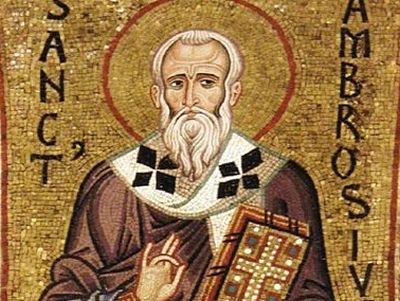This online lecture, “The Incarnation and the Cross: Understanding Christ’s Redemptive Act,” is recommended for your adult formation in the faith.
The online lecture is free but you have to register.
For information and to register, visit this link.
This online lecture, “The Incarnation and the Cross: Understanding Christ’s Redemptive Act,” is recommended for your adult formation in the faith.
The online lecture is free but you have to register.
For information and to register, visit this link.
 Today, the Church liturgically recalls the life and work of Our Holy Father Ephrem the Syrian.
Today, the Church liturgically recalls the life and work of Our Holy Father Ephrem the Syrian.
As we have seen, the theology of Syrian was a fountain of teaching about the incarnation of our Lord, especially his baptism in the Jordan. The feast of Theophany was the foremost manifestation of the Triune God. Among the Syrian theologians, none was most important than St. Ephrem.
Born of pagan parents, he found the Christian faith, was baptized and eventually ordained a deacon. His life was marked by asceticism, as he imitated our Lord in the desert. He had the ascetic gift of tears, sorrow for sin and joy in the salvation of our Lord. His Troparion begins, “Your abundant tears made the wilderness sprout and bloom, and your deep sighings made your labor fruitful a hundredfold. “His theology was equal to the greatest fathers, but his style was entirely different. He wrote in verse, so that it might be sung in hymns, and so he is called the “Harp of the Holy Spirit.”
The corpus of his work was huge, and over 400 hymns still exist, many of which are used in the Syrian Liturgy. He writes of the mystery of the Incarnation:
“A tiny stream from your teaching, Lord,
For us below makes a flood of interpretations.
In your Bread is hidden a Spirit not to be eaten,
In your Wine dwells a Fire not to be drunk.
Spirit in your Bread, Fire in your Wine,
A wonder set apart, [yet] received by our lips!
See, Fire and Spirit in the womb that bore you!
See, Fire and Spirit in the river where you were baptized!
Fire and Spirit in our Baptism;
In the Bread and the Cup, Fire and Holy Spirit!” (Hymns on the Faith 10)
Meditation by Archpriest David Petras
#ByzantineCatholicNewHaven
#ByzantineCT
#ByzantineConnecticut
 St. Ambrose was the greatest Archbishop of Milan, at a time when it was the center of the Empire. He was elected bishop when he was still a catechumen and proved to be most competent—in administration as well as theology, and was a holy and sincere Christian. He had been a governor before and knew how “to talk to power.” When the Emperor Theodosius had 7,000 Thessalonians slaughtered over the assassination of their governor, he excommunicated him for his horrendous crime – and made it stick, bringing Theodosius to repentance.
St. Ambrose was the greatest Archbishop of Milan, at a time when it was the center of the Empire. He was elected bishop when he was still a catechumen and proved to be most competent—in administration as well as theology, and was a holy and sincere Christian. He had been a governor before and knew how “to talk to power.” When the Emperor Theodosius had 7,000 Thessalonians slaughtered over the assassination of their governor, he excommunicated him for his horrendous crime – and made it stick, bringing Theodosius to repentance.
As a theologian, he wrote about the incarnation of the Son of God: “And the Word was with God . This that he said is to be understood thus: The Word was just as was the Father; since He was together with the Father, He was also in the Father, and He was always with the Father. […] It is of the Word to be with the Father; it is of the Father to be with the Word, for we read that the Word was with God. So if, according to your opinion, there was a time when He was not, then, according to your opinion, He too was not in the beginning with whom was the Word. For through the Word I hear, through the Word I understand that God was. For, if I shall believe that the Word was eternal, which I do believe, I cannot doubt about the eternity of the Father, whose Son is eternal” (The Sacrament of the Incarnation of our Lord (III, 15-18, from the Vatican web site).
And again, Ambrose says, “He lay in the crib, that you might stand at the altar. He came to earth, that you might come to the stars” (Exposition of Luke 2.41).
Meditation by Archpriest David Petras